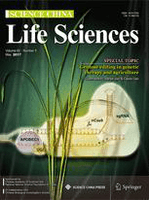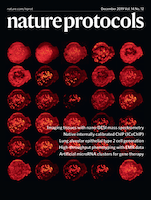
Bio-protocol
metrics 2024
Advancing life sciences with open-access protocols.
Introduction
Bio-protocol is an innovative open-access journal dedicated to the advanced fields of biochemistry, immunology, neuroscience, and plant science, published by BIO-PROTOCOL in the United States since 2023. With an E-ISSN of 2331-8325, this journal serves as a pivotal platform for sharing high-quality methodologies and experimental protocols, enabling researchers, professionals, and students to streamline their experimental workflows and enhance reproducibility in scientific research. In 2023, Bio-protocol achieved notable rankings, placing in the Q2 category for biochemistry, genetics, molecular biology, and immunology, as well as Q3 in neuroscience, reflecting its growing influence and relevance in these fields. The journal offers full open access, ensuring that cutting-edge research is freely available, promoting global collaboration and innovation in the life sciences. Engaging with Bio-protocol positions its readers at the forefront of significant scientific advancements and methodological developments.
Metrics 2024
 -
- 1.00
1.00 1.40
1.40 -
-Metrics History
Rank 2024
IF (Web Of Science)
JCI (Web Of Science)
Quartile History
Similar Journals

Science China-Life Sciences
Exploring the frontiers of life sciences with rigor and impact.Science China-Life Sciences, published by SCIENCE PRESS, is a premier academic journal that stands at the forefront of innovative research and discoveries in the fields of life sciences, spanning crucial areas such as agricultural and biological sciences, biochemistry, genetics, molecular biology, and environmental science. With an impressive Q1 ranking in its respective categories—ranked #5 in Agricultural and Biological Sciences, #7 in Environmental Science, and #17 in Biochemistry, Genetics and Molecular Biology—this journal is recognized for its rigorous peer-review process and significant impact within the scientific community, as reflected in its high percentiles (97th and 92nd). Maintained as an Open Access publication, it ensures broad dissemination and accessibility of research findings, fostering collaboration and knowledge sharing among researchers, professionals, and students alike. Given its position in the research landscape and its commitment to high-quality scholarship, Science China-Life Sciences plays a vital role in advancing life sciences research, supporting scientists in addressing global challenges through innovative biological solutions.

JOURNAL OF EXPERIMENTAL BOTANY
Leading the charge in plant science discoveries.JOURNAL OF EXPERIMENTAL BOTANY, published by Oxford University Press, stands as a premier journal for researchers and professionals in the fields of plant science and physiology. With an illustrious history dating back to 1950, this journal has established itself as a critical resource for advancing our understanding of plant biology and its applications. It is recognized in the top tier of academic publishing, reflected in its Q1 rankings in both Plant Science and Physiology for 2023, and boasts impressive Scopus rankings—placing it in the 96th and 91st percentiles of its respective categories. Though not an open-access journal, it ensures widespread access to groundbreaking research aimed at unraveling the complexities of plant functions and adaptations. As we look toward 2024, the JOURNAL OF EXPERIMENTAL BOTANY continues to play an essential role in fostering innovation, collaboration, and education within this vital area of science.

STAR Protocols
Sharing Knowledge, Shaping the Future of ResearchSTAR Protocols, published by Elsevier, is an esteemed open access journal that has been at the forefront of providing innovative experimental protocols since its inception in 2020. With a distinct focus on a range of scientific disciplines including Biochemistry, Genetics and Molecular Biology, Immunology and Microbiology, and Neuroscience, this journal serves as a vital resource for researchers, professionals, and students alike. The journal holds a commendable status, reflected by its Q1 and Q2 rankings across various relevant categories, ensuring the dissemination of high-impact research methods and findings. With its open access format, STAR Protocols encourages a broad readership and facilitates the sharing of pivotal knowledge in the scientific community, driving forward the culture of transparency and collaboration in research. Positioned in the vibrant academic landscape of the United States, it steadily contributes to the evolution of experimental methodologies, fostering innovation across disciplines.

Scientific Data
Connecting Researchers with High-Quality Data ResourcesScientific Data, published by NATURE PORTFOLIO, is a premier open-access journal that has been providing researchers with a platform to share high-quality data across various interdisciplinary fields since 2014. With its E-ISSN 2052-4463, the journal has established itself in the United Kingdom and gained global recognition. As of 2023, it has achieved remarkable quartile rankings, being placed in Q1 across several categories including Computer Science Applications, Education, Information Systems, Library and Information Sciences, and Statistics and Probability. These rankings highlight its pivotal role in advancing data sharing and methodologies, which are critical to fostering innovation and collaboration in research. The journal’s strong Scopus rankings, with top positions in Mathematics, Decision Sciences, and Social Sciences reinforce its importance as a key resource for academics, professionals, and students seeking to utilize and contribute to the rich ecosystem of scientific data. With open access options, Scientific Data empowers a diverse audience to engage with the latest research findings and datasets, ensuring that invaluable insights are accessible to all.

AMERICAN JOURNAL OF BOTANY
Unveiling Nature's Secrets Through Cutting-Edge ResearchAmerican Journal of Botany, an esteemed publication by Wiley, serves as a pivotal platform for the dissemination of groundbreaking research in the fields of botany, ecology, plant science, and genetics. With an illustrious history dating back to 1946, this journal holds a prestigious position in the academic community, evident through its Q1 ranking in both Ecology, Evolution, Behavior and Systematics and Plant Science, alongside a Q2 ranking in Genetics as of 2023. The journal maintains a competitive edge, ranked 159th in Ecology and Evolution and 124th in Plant Science according to Scopus metrics, underscoring its impact within the research landscape. Though traditionally not an open-access journal, it continues to provide valuable insights and advancements in botanical science, making it essential reading for researchers, professionals, and students dedicated to understanding and exploring the complexities of plant life. The journal's commitment to high-quality research ensures that it remains a cornerstone in the pursuit of knowledge in botany and related disciplines.

Nature Protocols
Driving Forward the Frontiers of Biochemistry and GeneticsNature Protocols, published by NATURE PORTFOLIO, is a premier academic journal specializing in the dissemination of innovative and practical experimental methodologies in the vast field of biochemistry, genetics, and molecular biology. With an impressive Scopus rank of #5 out of 221 journals and a 97th percentile status, it stands firmly in the Q1 quartile, reflecting its integral role in advancing scientific knowledge. Established in 2006, this journal provides an invaluable resource for researchers and practitioners aiming to refine their experimental techniques, ultimately driving forward the frontiers of life sciences. While currently operating under a subscription model, the journal continues to be a pivotal platform for sharing high-quality, peer-reviewed protocols that facilitate reproducibility and transparency in research. Addressing a global audience from its base in the United Kingdom, Nature Protocols is dedicated to fostering collaboration and innovation, making it indispensable for professionals and students engaged in cutting-edge scientific endeavors.

CRYOLETTERS
Advancing the frontiers of cryobiology and preservation.CRYOLETTERS is a pioneering journal dedicated to the interdisciplinary fields of agronomy, anatomy, and medicine, with a particular focus on the biological implications of cryobiology and cryopreservation processes. Published in the United Kingdom by CRYO LETTERS, this esteemed journal has been disseminating pivotal research findings since 1993, providing a vital platform for both emerging and established researchers. With an impact factor reflective of its Q3 categorization in Agronomy and Crop Science, Anatomy, and miscellaneous Medicine, CRYOLETTERS is positioned as a significant contributor to the academic discourse in these areas. The journal's commitment to advancing knowledge facilitates crucial advancements in both scientific research and practical applications, making it essential reading for professionals and students alike. While access options vary, the journal upholds rigorous peer-review standards, ensuring that published works meet the highest scholarly criteria.

PeerJ
Fostering collaboration in Agricultural and Biological Sciences.PeerJ, with an ISSN of 2167-8359 and E-ISSN of 2167-8359, is a prominent open-access journal published by PEERJ INC since 2013. Based in the United States, PeerJ is dedicated to advancing knowledge across various disciplines, with a notable focus on Agricultural and Biological Sciences, Biochemistry, Genetics and Molecular Biology, Medicine, and Neuroscience. PeerJ has quickly established itself in the academic community, achieving impressive rankings such as Q1 in Agricultural and Biological Sciences and Q2 in both Biochemistry and Medicine in 2023. With its robust open-access model, PeerJ ensures widespread accessibility of cutting-edge research, facilitating collaboration and dissemination of findings that push the boundaries of scientific inquiry. The journal's impact and reach continue to grow, making it an essential resource for researchers, professionals, and students alike who are keen on contributing to and learning from cutting-edge scientific discourse.

Biology Methods & Protocols
Unlocking the potential of biology with cutting-edge techniques.Biology Methods & Protocols is a pioneering open-access journal published by Oxford University Press, dedicated to advancing the field of biological research through the dissemination of cutting-edge methodologies and protocols. Since its inception in 2016, the journal has established a prominent presence in the academic community, achieving an impressive Q1 ranking in Agricultural and Biological Sciences (miscellaneous) and a Q2 ranking in Biochemistry, Genetics, and Molecular Biology (miscellaneous) as of 2023. With a Scopus rank that places it among the top 69% in its field, the journal serves as an essential resource for researchers, practitioners, and students seeking reliable and innovative techniques for their experiments. The publication not only promotes the sharing of high-quality protocols that can be readily adopted in laboratories globally but also encourages collaboration and knowledge sharing among scientists. Embracing an open-access model, Biology Methods & Protocols ensures that vital advancements in biological methodologies are accessible to all, thereby fostering a more inclusive scientific community.

Applied Biological Research
Advancing the Frontiers of Biological ScienceApplied Biological Research is a dynamic journal issued by the CENTRE ADVANCEMENT APPLIED SCIENCES, specializing in the interdisciplinary fields of biochemistry, genetics, and molecular biology. With its ISSN 0972-0979 and E-ISSN 0974-4517, this journal serves as a critical platform for the dissemination of peer-reviewed research that addresses pressing challenges and innovations within biological sciences. Although currently it does not adopt an Open Access model, it is dedicated to fostering academic discourse through rigorous publication practices. The journal's impact is underscored by its Scopus rankings, which place it in the 4th and 2nd percentiles in respective categories, emphasizing its emerging influence in the scientific community. Covering research from 2020 to 2024, Applied Biological Research is positioned as an essential read for researchers, professionals, and students seeking to stay at the forefront of biological research and application. Based in the beautiful region of Jammu & Kashmir, India, this journal is committed to advancing applied sciences through innovative research and outreach.